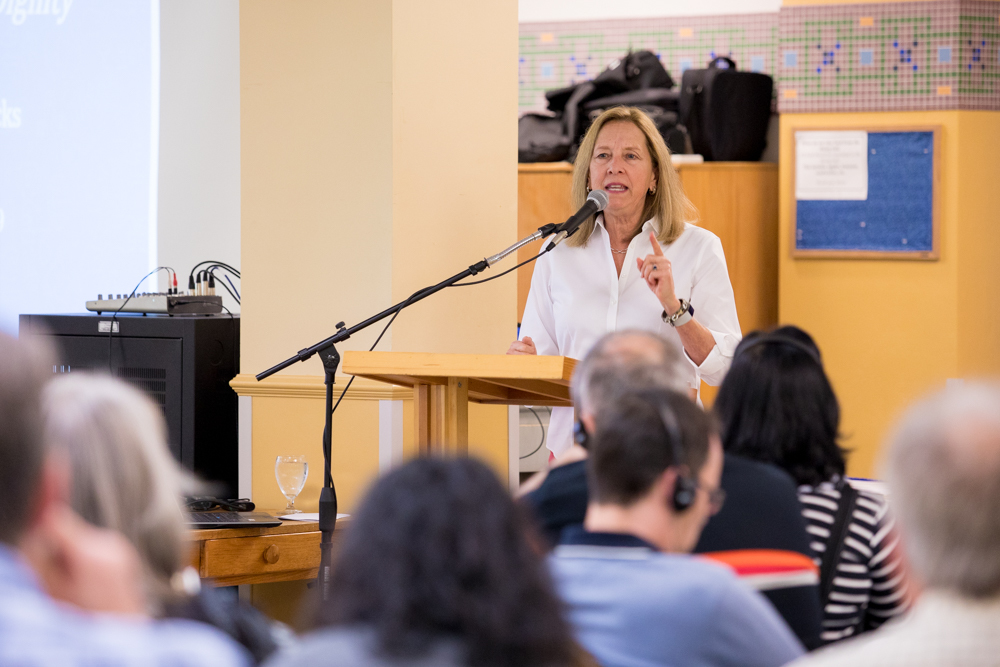Donna Hicks, conflict resolution specialist and author of two books on dignity, returned to Eastern Mennonite University in April to speak at the Summer Peacebuilding Institute.
A veteran negotiator who has worked in conflicts around the world, including in the Middle East, Ireland, Colombia, Sri Lanka, she is an associate at the Weatherhead Center for International Affairs in Harvard University. Hicks’ development of the dignity model and its importance to leadership has expanded her impact beyond the peacebuilding world. She is the author of Leading with Dignity: How to Create a Culture That Brings Out the Best in People (Yale University Press, 2018) and Dignity: Its Essential Role in Resolving Conflict (Yale University Press, 2011).
Hicks was the second of four Horizons of Change luncheon speakers at SPI. [During the first luncheon, Tecla Namachanja Wanjala MA ’04 was honored as CJP’s Peacebuilder of the Year.]
On May 28, she addressed a crowd of faculty, staff and international attendees, including a group of 54 Brazilian judges, attorneys and restorative justice practitioners. Her talk was simultaneously translated into Portuguese.
She was introduced by Barry Hart, a professor of trauma, identity and conflict studies at the Center for Justice and Peacebuilding who also teaches and researches about dignity in various contexts. Hart noted that Hicks has visited EMU before and her work is taught in several graduate courses.
Dignity violations were an ‘unspoken conversation’
The concept of dignity arose from Hicks’ long experience with conflict resolution facilitations, during which she observed a telling phenomena —“an invisible, emotional tsunami”— that often hindered negotiations.
“This unspoken conversation and emotional turmoil was preventing the parties from signing on to an agreement even when they knew it was in their best interests to come together and compromise,” she said. “We needed to have a different conversation, to stop talking about the politics and start talking about the anger and the resentment and being treated as less than human.”
These emotional wounds were trauma-based, but Hicks found that trauma wasn’t a useful word. Dignity, however, was. “The questions they were essentially asking were about dignity: ‘How dare you treat us this way? Can’t you see we’re human beings? Can’t you see we are suffering?’
Over time, Hicks learned how to encourage those in conflict negotiation to talk openly about how their dignity had been violated, perhaps over years or decades. This eventually led to a model of conflict resolution with a deep foundation in understanding dignity consciousness — the idea that we are all of inherent worth as human beings. “Each of us wants to be treated with dignity,” she said. “When we’re not, we suffer, and when we are, we flourish.”
Educating leadership is key to progress
Recent studies in neuroscience have proven that wounds to one’s dignity are just as physically and emotionally traumatizing as a wound that bruises or draws blood, she said, yet they’re not visible. Humans need to be reminded on a daily basis “of how precious we are … that we are fragile and need to be handled with care.”
During the Q and A session, Hicks was asked to how she understands the forces of oppression and power at work. Though she said that restorative justice, peacebuilding and diversity training is one way to confront structural indignities, Hicks has lately focused on educating leaders.
“As leaders, we have the power to disempower others or we can empower others,” she said. “This is what we have to come to terms with. We have decide how we will use that precious power. The only antidote is to have people in positions of authority understand this. It’s an educational enterprise.”
Next speaker
- Tuesday, June 11: Jodie Geddes and Tom DeWolf are members of Coming to the Table, an organization that started with 20 people at EMU in 2006 and has grown to thousands in 12 states. They recently co-authored The Little Book of Racial Healing, which came about during the 2016 restorative justice conference held on campus at EMU.
To register for a Horizons of Change lunch ($20 for non-SPI participants, $16 for EMU faculty and staff), please contact Alison D’Silva at dsilvam@emu.edu.
